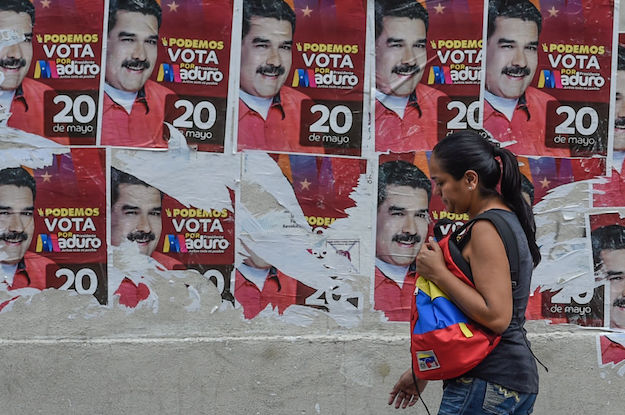The nearly two months since Nicolás Maduro won a rigged presidential election on May 20 have not been good to Venezuela’s opposition. Though the opportunity was there, Maduro’s opponents – both those backing abstention and those supporting candidate Henrí Falcón – failed to come up with an election strategy that could have put meaningful pressure on the government. As a result, all of them emerged on May 21 looking as divided and feckless as ever.
What comes next for Venezuela’s opposition – and whether change is now more likely to come from within chavismo than from without – is an open question.
To begin with, it is unclear what faction of the opposition holds most sway with the general public. In the days since the election, the outlines of three main blocs have taken shape. The first are those who reject any elections or dialogue as the route out of the conflict with Maduro (María Corina Machado, Antonio Ledezma and others). Mainstream actors from the MUD opposition coalition represent a second group: They won’t entirely reject negotiation or elections as a path to resolution, but have become much more cautious in how much leeway they are willing to give the government to get there. The third group consists of those with less reserve who are still interested in actively pursuing an agreement with Maduro (led by Falcón and his supporters).
The distance between these groups will be difficult to bridge. Even today, many in the opposition are reluctant to put fighting the regime ahead of their personal interests. The alarming number of opposition figures in exile, in prison or under threat makes it even harder for these different factions to coordinate.
At the same time, none of these groups has been able to impose its leadership over the others by proving that it can rally the majority of Venezuelans seeking change to their cause. More importantly, none has shown the type of leadership needed to meet the challenges at hand. As a result, the general public continues to put its faith in the apparition of an outsider, the hope for a savior who can restore morale and offer real solutions to their problems.
A glimmer of hope came in March, with the arrival of the Frente Amplio Venezuela Libre (FAVL), a new coalition that included not just politicians, but also social actors such as the church, universities, students, businesses and non-profit organizations. But that initiative has so far floundered, in good measure due to traditional political figures’ resistance to a new group of power that could rival their own ambitions. Maneuvering to take control of the group has turned public opinion against it, and another chance to concentrate opposition to Maduro has gone begging.
Meanwhile, social tensions are starting to mount. In Venezuela there are around 30 protests or demonstrations every day. Most are focused on social issues, anger over the lack of public services and calls for security. Media censorship, however, means most of the protests go unreported, and any leadership capable of connecting them has been non-existent.
All of this is happening even as the regime in question faces a number of destabilizing challenges. Maduro remains in power despite hyperinflation, increasing international condemnation of his leadership, increased difficulty in maintaining social control through handouts, and disparate movements within chavismo that are angling for power. These challenges have led to the systematic removal of threats from within the military – often through intimidation or imprisonment – changes to the cabinet and, most recently, the rise in power of Diosdado Cabello.
Cabello had until recently been in near permanent struggle with the group closest to Maduro, representing a meaningful threat to his leadership. Maduro’s efforts to give Cabello a greater stake in the current regime, in particular after he was named president of the National Constituent Assembly, shows once again how the government is willing to adapt to circumstance, shifting in place to avoid situations that could dislodge it. So far, Maduro has been able to do this without undue cost.
The international community, for its part, has ramped up activity vis-à-vis Venezuela. The camp in favor of putting more pressure on Maduro has gained supporters, and sanctions have become stricter.
But this pressure will not remain indefinitely. The global community is interested in stability in Venezuela, and the majority want to see that stability accompanied by a turn toward democracy. But if the hope in that outcome starts to look impossibly misplaced, the mood may shift. The international community may eventually decide that non-democratic stability – particularly if it comes with more moderate economic policy – is an acceptable alternative. That type of shift is most likely to come from a challenge to Maduro from within the group in power – that is to say, from within chavismo.
Will something change to breathe life into the opposition? Time is running short, and the government is already planning its next moves. The group in power is unlikely to collapse unless it can be fractured, and for such a break to occur it needs to face significant pressure. International pressure is there, as is social tension. The missing piece is political. For the opposition to make use of support from the international community – and the pockets of activism within Venezuela – it needs to prove it can turn that support into meaningful change on the ground. Right now, that kind of opposition doesn’t exist. Venezuelans should put as much energy as they can into creating one.
—
Seijas Rodríguez, Ph.D., is a Venezuelan political analyst and statistician. He is the director of the Delphos poll.








